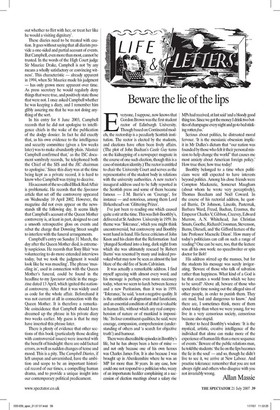Beware the lie of the lips
Everyone, I suppose, now knows that Gordon Brown was the first student rector of Edinburgh University. Though based on Continental models, the rectorship is a peculiarly Scottish institution. The rector is elected by the students, and elections have often been lively affairs. (The plot of John Buchan's Castle Gay turns on the kidnapping of a newspaper magnate in the course of one such election, though this is a case of mistaken identity.) The rector is entitled to chair the University Court and serves as the representative of the student body in relations with the university authorities. A new rector's inaugural address used to be fully reported in the Scottish press and some of them became famous — J. M. Ban-ie's on 'Courage', for instance — and notorious, among them Lord Birkenhead's on 'Glittering Prizes'.
I've just been re-reading one which caused quite a stir at the time. This was Bob Boothby's, delivered at St Andrews University in 1959. Its theme was 'Tolerance', which you might think uncontroversial, but controversy and Boothby went hand in hand. His fierce criticism of John Knox and his claim that the Reformation had 'plunged Scotland into a long, dark night from which she was ultimately rescued by Robert Burns' was resented by many and indeed provoked what may now be seen as almost the last blaze of the old fire of Scots Calvinism.
It was actually a remarkable address. I find myself agreeing with almost every word, and his message is perhaps even more necessary today, when we seem to lurch between licence and a new Puritanism, than it was in 1959. 'Tolerance,' he said, 'is not a negative quality. It is the antithesis of dogmatism and fanaticism; and an essential condition of all that is valuable in human life, without which any real comprehension of nature or of mankind is impossible.' Its four constituent qualities, he said, were courage, compassion, comprehension (understanding of others and 'a search for objective truth') and humour.
There were discreditable episodes in Boothby's life, but he has always been a hero of mine — and not only because one of his own heroes was Charles James Fox. It is also because I was brought up in Aberdeenshire where he was an MP for more than 30 years. In any case, how could one not respond to a politician who, weary of an importunate heckler complaining at a succession of election meetings about a salary rise MPs had received, at last said 'and a bloody good thing too. Since we got the money I drink two bottles of champagne every night and go to bed stinking rottenfou.'
Serious about politics, he distrusted moral fervour. 'It is the messianic obsession implicit in Mr Dulles's dictum that "our nation was founded by those who felt it their personal mission to help change the world" that causes me most anxiety about American foreign policy.' How true then; how true today!
Boothby belonged to a time when politicians were still expected to have interests beyond politics. Among his close friends were Compton Mackenzie, Somerset Maugham (about whom he wrote very perceptively), Thomas Beecham and Noel Coward. In the course of his rectorial address, he quoted Barrie, Dr Johnson, Lincoln, Pasternak, Barbara Ward, Freud, Buchan, Erasmus, the Emperor Charles V, Gibbon, Creevey, Edward Murrow, A. N. Whitehead, Jan Christian Smuts, Goethe, Richard Crossman, Stevenson, Burns, Disraeli, and `the Gifford lecture of the late Professor Macneile Dixon'. How many of today's politicians can call on such a range of reading? One can be sure, too, that the lecture was all his own work: no speechwriter or spin doctor for Bob!
His address stirred up the manses, but for the students his message was surely invigorating. 'Beware of those who talk of salvation rather than happiness. What kind of a God is he that creates a world from which we have to be saved? Above all, beware of those who spend their time nosing out the alleged sins of other people, in order to punish them. They are mad, bad and dangerous to know.' And there are, I sometimes think, more of them about today than when we were young, for we live in a very censorious society, censorious because also stupid.
Better to heed Boothby's wisdom: 'It is the mystical, artistic, creative intelligence of the individual that alone can make more of the experience of human life than a mere sequence of events.' Beware of the public relations man, he told the students: `the lie on the lips becomes the lie in the soul' — and so, though he didn't live to see it, we arrive at New Labour. And practise tolerance: remember that you are not always right and others who disagree with you not invariably wrong. Allan Massie












































 Previous page
Previous page